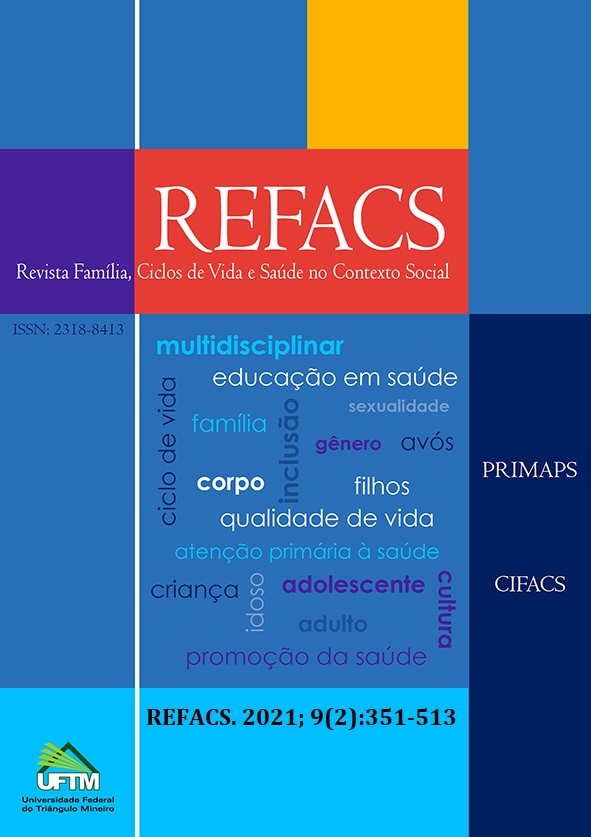Hate speech in the psychoanalytic clinic
DOI:
https://doi.org/10.18554/refacs.v9i2.5424Keywords:
Psychoanalysis, Aggression, Hate, Psychological distress.Abstract
This is a narrative review carried out between 2018 and 2020, influenced by the global context. It aims to analyze hate speech phenomena and their manifestations in conjunction with the psychoanalytic theory, as well as clinical management. From the perspective of the Freudian theory, the possible unconscious motivations of those who use hate speech are explored and an attempt is made to identify its impact on the mental health of their targeted individuals. Three thematic areas are brought into the debate, namely: Hate speech in society, Hate speech and the psyche, and Hate speech in the psychoanalytic clinic. There are countless examples of hate speech throughout history, which do not seem to lose power even in a social scenario in which they are widely questioned and condemned. Its persistence is justified in the Freudian hypotheses about destructive impulses inherent to human beings, their resources for identification, and their narcissistic motions. Psychoanalytic theory brings to light the origins of the human desire for destruction and reveals an unpalatable notion: it is not possible to fully rid oneself of that desire. Psychoanalysis allows individuals to find healthier ways to channel these narcissistic impulses, identifications and motivations, seeing as their exacerbation can potentially cause psychic illness - in addition to the possibility of culminating in the real annihilation of these many "others".
References
Freud S. O mal-estar na civilização. In: O mal-estar na civilização, Novas conferências introdutórias à psicanálise e outros textos (1930-1936). Souza PC, tradutor. São Paulo: Companhia das Letras; 2010.
Freud S. Psicologia das massas e análise do eu. In: Freud S. Psicologia e análise do eu e outros textos de 1920-1923. Souza PC, tradutor. São Paulo: Companhia das Letras; 2010.
Oxford Dictionaries. Hate speech. [Internet]. [citado em 10 nov 2018]. Disponível em: https://en.oxforddictionaries.com/definition/hate_speech
Mcgonagle T. The Council of Europe against online hate speech: conundrums and challenges [Internet]. In: Council of Europe Conference of Ministers Responsible for Media and Information Society; 2013; Belgrado, Sérvia. Amsterdã, Holanda: Institute for Information Law (IViR); 2013 [citado em 10 nov 2018]. p. 15. Disponível em: https://www.ivir.nl/publicaties/download/Expert_paper_hate_speech.pdf
Schafer G, Leivas PG, Santos RH. Discurso do ódio: da abordagem conceitual ao discurso parlamentar. Rev Inf Legislat. [Internet]. 2015 [citado em 10 nov 2018]; 52(207):143-58. Disponível em: http://www2.senado.leg.br/bdsf/item/id/515193
Brown NLM, Stentiford BM. The Jim Crow encyclopedia. Westport, CT: Greenwood; 2008.
Macagno L. Etnografia e violência no país do apartheid: dois relatos sobre a África do Sul. Hist Quest Deb. 2015 [citado em 27 out 2020]; 62(1)133-62. Disponível em: https://revistas.ufpr.br/historia/article/view/44150/26711
Ramón Mendos L. State-sponsored homophobia [Internet]. 13thed. Geneva: ILGA; 2019 [citado em 12 nov 2019]. Disponível em: https://ilga.org/downloads/ILGA_State_Sponsored_Homophobia_2019.pdf
Freud S. Introdução ao narcisismo. In: Freud S. Introdução ao narcisismo: ensaios de metapsicologia e outros textos de 1914-1916. Souza PC, tradutor. São Paulo: Companhia das Letras; 2010. p. 13-50.
Freud S. Os instintos e seus destinos. In: Freud S. Introdução ao narcisismo: ensaios de metapsicologia e outros textos de 1914-1916. Souza PC, tradutor. São Paulo: Companhia das Letras; 2010. p. 75-6
Freud S. Além do princípio do prazer. In: Freud S. História de uma neurose infantil (“O Homem dos Lobos”), Além do princípio do prazer e outros textos. Souza PC, tradutor. São Paulo: Companhia das Letras; 2010. p. 161-239.
Green A. Narcisismo de vida, narcisismo de morte. Berliner C, tradutora. São Paulo: Escuta; 1988. p. 141-2.
Freud S. O eu e o id. In: O eu e o id, "autobiografia" e outros textos (1923-1925). Souza PC, tradutor. São Paulo: Companhia das Letras; 2011. p. 13-74.
Wahba LL. A estranheza do outro e os limites da tolerância. Junguiana [Internet]. 2017 [citado em 04 ago 2020]; 35(2):5-12. Disponível em: http://pepsic.bvsalud.org/pdf/jung/v35n2/02.pdf
Fulber VG. Retórica de ódio, cultura e pulsões. Estud Psicanál. [Internet]. 2019 [citado em 04 ago 2020]; 51:139-47. Disponível em: http://pepsic.bvsalud.org/pdf/ep/n51/n51a13.pdf
Nogueira IB. Cor e inconsciente. In: Kon NM, Silva ML, Abud CC, organizadores. O racismo e o negro no Brasil: questões para a psicanálise. São Paulo: Perspectiva; 2017. p. 121-6.
Pereira MLIEM. Faces da violência: trauma, exílio, luto, culpa. In: Ocariz MC, organizadora. Psicanálise e violência social. São Paulo: Escuta; 2018. p. 69-87.
Laplanche J, Pontalis JB. Vocabulário da psicanálise. São Paulo: Martins Fontes; 2001. 554p.
Ferenczi S. Análise de crianças com adultos. In: Ferenczi S. Psicanálise IV. São Paulo: Martins Fontes; 1992. p. 79-95.
Ocariz MC. As contribuições da psicanálise diante dos efeitos da violência social. In: Ocariz MC, organizadora. Psicanálise e violência social. São Paulo: Escuta; 2018. p. 25-44.
Frosh S. Reconhecimento, desculpas e perdão entre os que “vêm depois”. In: Ocariz MC, organizadora. Psicanálise e violência social. São Paulo: Escuta; 2018. p. 109-21.
Published
How to Cite
Issue
Section
License
Each of the authors of the manuscript must complete and sign a copy of Statement of Responsibility and Copyright Transfer Agreement, which must be attached, by the submitting author, in step 4 of the submission process in the journal system (Click on the "Browse" option, select the file that should be inserted in pdf format, click on the "Download" button, in the "Title" field type: Declaration of responsibilities, then click the "Save and Continue" button and proceed with the submission process.
Note: Including scanned signature will not be accepted. Each author of the manuscript must complete a declaration individually.

REFACS de Universidade Federal do Triângulo Mineiro está licenciado com uma Licença Creative Commons - Atribuição-NãoComercial 4.0 Internacional.
Baseado no trabalho disponível em www.uftm.edu.br.
Podem estar disponíveis autorizações adicionais às concedidas no âmbito desta licença em http://www.uftm.edu.br/refacs.



